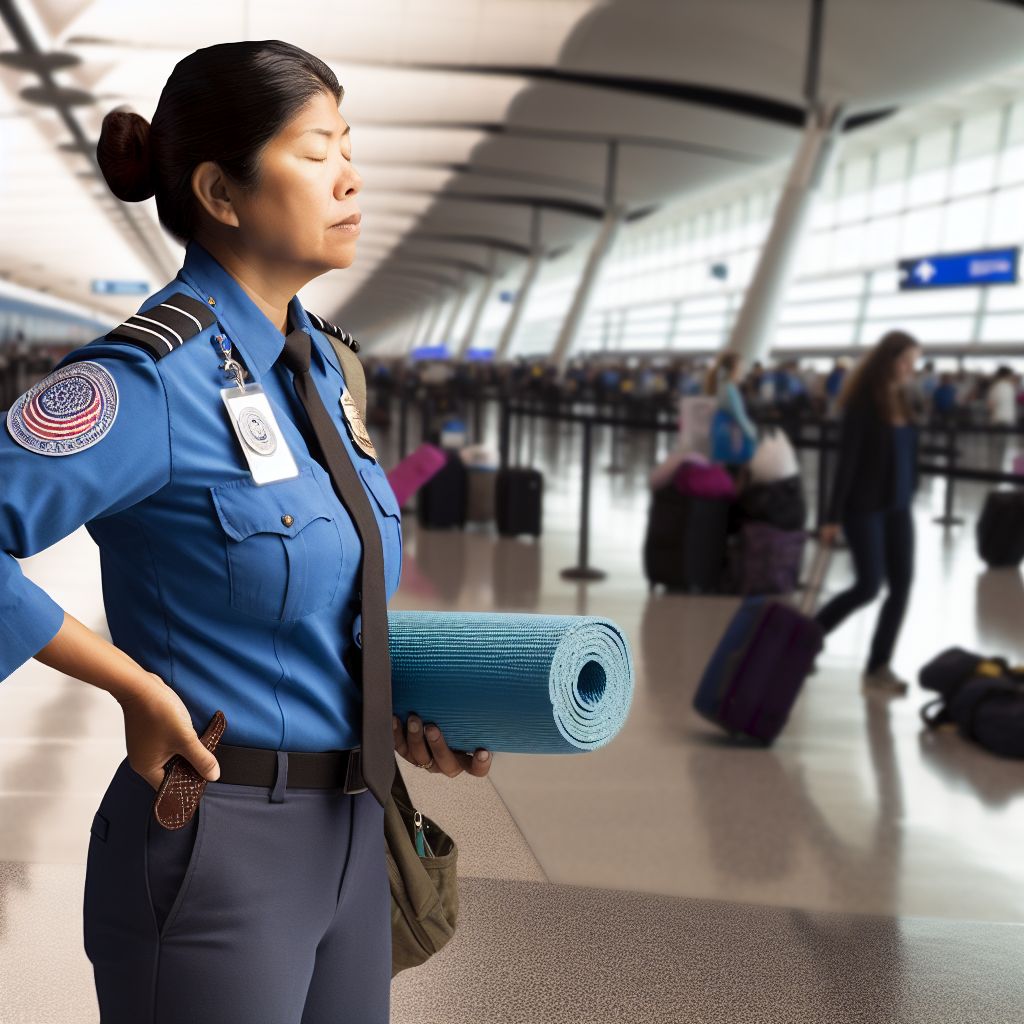Introduction:
As TSA officers play a crucial role in ensuring airport security, they work in a high-stress environment with a high potential for burnout.
Managing stress and preventing burnout is essential for the well-being of TSA officers.
The Impact of Stress on TSA Officers:
The nature of their job exposes TSA officers to constantly changing situations that require quick decision-making, which can lead to high levels of stress.
Recognizing the Signs of Burnout:
TSA officers may experience physical symptoms like fatigue, headaches, or digestive issues, as well as emotional symptoms like irritability or detachment from their work.
Strategies for Managing Stress:
Implementing relaxation techniques such as deep breathing or mindfulness can help TSA officers cope with stress and prevent burnout.
Seeking Support:
TSA officers should not hesitate to seek support from their colleagues, supervisors, or mental health professionals if they are struggling with stress or burnout.
Importance of Self-Care:
Engaging in activities outside of work, maintaining a healthy work-life balance, and prioritizing self-care are crucial for TSA officers to prevent burnout and maintain their well-being.
Effective Stress Management Techniques:
By recognizing the signs of burnout, implementing stress management strategies, seeking support, and prioritizing self-care, TSA officers can effectively manage stress and prevent burnout in their demanding roles.
Recognizing signs of stress and burnout:
- Physical symptoms like fatigue, headaches, and muscle tension
- Emotional signs such as irritability, anxiety, and feeling overwhelmed
- Behavioral indicators including decreased job performance and absenteeism
Physical symptoms:
Being a TSA officer is a demanding job that requires long hours of standing and constant attention to detail.
It’s not uncommon to experience physical symptoms such as fatigue, headaches, and muscle tension.
These signs can indicate that your body is under stress and needs rest.
Emotional signs:
Working in a high-pressure environment like an airport can take a toll on your mental health.
If you find yourself feeling irritable, anxious, or overwhelmed, it may be a sign that you are experiencing burnout.
It’s important to acknowledge these emotions and seek support.
Behavioral indicators:
One of the key signs of burnout is a noticeable decrease in job performance.
If you find yourself struggling to concentrate, make more mistakes than usual, or feel unmotivated to do your job, it could be a red flag.
Additionally, frequent absenteeism or tardiness may also indicate burnout.
By recognizing these signs early on, you can take proactive measures to manage your stress and prevent burnout.
It’s essential to prioritize self-care and seek help when needed.
Remember, your well-being is as important as the safety and security of the passengers you serve.
Transform Your Career Today
Unlock a personalized career strategy that drives real results. Get tailored advice and a roadmap designed just for you.
Start NowImplementing Self-Care Practices
Prioritizing adequate sleep and rest is essential for your well-being.
Establish a regular sleep schedule to ensure consistency and quality rest.
Create a calming bedtime routine to signal your body it’s time to unwind.
Avoid electronic devices before bed to prevent disruption in your sleep patterns.
Engaging in regular physical activity helps reduce stress.
Incorporate exercise into your daily routine, even if it’s just a short walk.
Explore different types of physical activities to find what you enjoy.
Use exercise as a way to release built-up tension and boost your mood.
Eating a balanced diet supports overall well-being.
Include a variety of fruits, vegetables, whole grains, and lean proteins in your meals.
Limit processed foods, sugar, and caffeine intake to avoid energy crashes.
Stay hydrated throughout the day to support your body and mind.
By incorporating these self-care practices into your routine, you can better manage stress.
Taking care of yourself is essential for maintaining mental and physical well-being.
Ensure you are ready to thrive in a demanding environment as a TSA officer.
Uncover the Details: Bomb Squad Technicians in Popular Culture
Seeking support from colleagues and supervisors:
When it comes to managing stress and burnout as a TSA officer, seeking support from colleagues and supervisors is crucial.
Here are some key ways to effectively leverage this support:
Building a strong support network within the TSA team:
- Engage with your fellow TSA officers on a regular basis to build rapport and trust.
- Create opportunities for team bonding activities to foster a sense of unity and camaraderie.
- Encourage open communication and mutual support among team members to create a positive work environment.
- Offer help and guidance to colleagues in need, and don’t hesitate to seek help when you need it.
Communicating openly about stressors and challenges:
- Be transparent about the stressors and challenges you are facing in your role as a TSA officer.
- Express your feelings and emotions to your colleagues and supervisors in a constructive manner.
- Listen actively to your peers when they share their own stressors and challenges, and offer empathy and support.
- Seek feedback and advice from colleagues on how to navigate challenging situations and overcome obstacles.
Collaborating with supervisors to address workload issues and potential solutions:
- Schedule regular meetings with your supervisor to discuss workload issues and potential solutions.
- Present data and evidence to support your concerns about workload and stress levels.
- Brainstorm together with your supervisor on strategies to lighten the workload and improve productivity.
- Implement changes and adjustments based on the agreed-upon solutions, and assess their effectiveness over time.
By seeking support from your colleagues and supervisors, you can create a support system that will help you navigate the challenges of being a TSA officer and manage stress and burnout effectively.
Find Out More: How to Handle Stress as a Disaster Response Coordinator
Transform Your Career Today
Unlock a personalized career strategy that drives real results. Get tailored advice and a roadmap designed just for you.
Start NowUtilizing stress management techniques:
Practicing mindfulness and meditation to stay present and calm
One effective way to manage stress as a TSA officer is to incorporate mindfulness and meditation into your daily routine.
By practicing mindfulness, you can stay present in the moment and avoid getting overwhelmed by stressors.
Meditation can help calm your mind and reduce anxiety, allowing you to approach your work with a clear and focused mindset.
Deep breathing exercises to reduce anxiety and tension
Another powerful tool for managing stress is deep breathing exercises.
When you feel overwhelmed or anxious, take a moment to focus on your breath.
Inhale deeply through your nose, hold for a few seconds, and exhale slowly through your mouth.
This simple technique can help lower your heart rate, reduce tension in your body, and promote a sense of relaxation.
Taking short breaks throughout the workday to recharge and refocus
It’s essential to prioritize self-care and take short breaks during your workday to recharge and refocus.
Stepping away from your duties for even just a few minutes can help prevent burnout and improve your overall mood.
Use your breaks to stretch, walk around, or engage in activities that bring you joy and relaxation.
Gain More Insights: How to Become a Licensed Private Investigator
Setting boundaries and practicing work-life balance:
As a TSA officer, it’s crucial to establish boundaries to prevent burnout and manage stress effectively.
Here are some practical strategies to help you achieve work-life balance:
- Creating boundaries between work responsibilities and personal life: It’s essential to set clear limits on the time and energy you devote to your job. Avoid bringing work-related stress home with you by establishing boundaries.
- Allocating time for hobbies and activities outside of work: Engaging in hobbies and activities you enjoy can help you unwind and recharge. Whether it’s exercising, reading, or pursuing a creative passion, make time for activities that bring you joy.
- Using vacation time to rest and rejuvenate: Don’t underestimate the power of taking time off to relax and recharge. Use your vacation days wisely to rest, spend time with loved ones, and engage in activities that help you decompress.
By setting boundaries and prioritizing work-life balance, you can improve your overall well-being and resilience as a TSA officer.
Remember that it’s essential to take care of yourself to better serve others and fulfill your responsibilities effectively.
You Might Also Like: Crime Scene Investigator Role in Court Testimonies

Attending training and workshops on stress management:
Participating in TSA-sponsored workshops on stress reduction.
Transform Your Career Today
Unlock a personalized career strategy that drives real results. Get tailored advice and a roadmap designed just for you.
Start NowLearning new techniques and strategies for coping with stress.
Engaging in ongoing professional development to enhance resilience.
Participating in workshops and training sessions focused on stress management can be highly beneficial for TSA officers.
These opportunities provide a platform to learn and implement new techniques for dealing with stress effectively.
By attending TSA-sponsored workshops on stress reduction, officers can gain valuable insights from experts in the field and connect with peers facing similar challenges.
Learning new strategies for coping with stress is essential for maintaining mental well-being in a demanding work environment.
These workshops offer practical tools that can be applied in real-life situations, helping officers navigate stressful situations with greater ease and confidence.
By gaining a deeper understanding of stress management techniques, officers can improve their overall resilience and mental health.
Engaging in ongoing professional development is crucial for enhancing resilience and building coping mechanisms to combat burnout.
These workshops provide a safe space for officers to explore different approaches to stress management and develop a personalized plan for self-care.
By actively participating in these training sessions, officers can proactively address stressors and prevent burnout before it becomes overwhelming.
Attending training and workshops on stress management is a valuable investment in the well-being of TSA officers.
These opportunities empower officers to take control of their mental health and equip them with the tools necessary to thrive in a high-pressure work environment.
By prioritizing ongoing professional development, officers can build resilience, enhance coping strategies, and ultimately mitigate the risks of burnout.
Utilizing Employee Assistance Programs
Taking advantage of mental health services provided by TSA.
Seeking counseling or therapy to address burnout and emotional well-being.
Connecting with resources for further support and guidance.
Employee Assistance Programs
Employee assistance programs (EAPs) are designed to support employees in managing stress, burnout, and other psychological challenges that may arise in the workplace.
TSA officers can benefit greatly from utilizing these programs to help cope with the demands of their job.
Mental Health Services Offered by TSA
TSA provides access to mental health professionals who can offer confidential counseling and support to officers experiencing stress or burnout.
Transform Your Career Today
Unlock a personalized career strategy that drives real results. Get tailored advice and a roadmap designed just for you.
Start NowBy taking advantage of these services, officers can address their mental health needs and work towards improving their overall well-being.
Counseling and Therapy
Seeking counseling or therapy is a proactive step towards addressing burnout and emotional well-being.
These services can help officers process their feelings, develop coping strategies, and gain perspective on their challenges.
By engaging in therapy, officers can learn to manage stress more effectively and improve their mental health.
Connecting with Additional Resources
In addition to TSA’s internal resources, officers can benefit from connecting with external resources for further support and guidance.
This could include community mental health services, support groups, or online resources that offer information and strategies for managing stress and burnout.
By exploring these resources, officers can expand their support network and access a variety of tools to help them cope with the demands of their job.
Utilizing employee assistance programs can significantly benefit TSA officers in managing stress and burnout.
By taking advantage of mental health services, seeking counseling or therapy, and connecting with resources for additional support, officers can prioritize their well-being and build resilience in the face of the challenges they may encounter in their roles.
Reflecting on Personal Goals and Motivations:
As a TSA officer, it is important to take the time to reflect on your personal goals and motivations.
By identifying your career aspirations and personal values, you can align your work with what truly matters to you.
Revisiting your goals regularly allows you to stay motivated and engaged in the demanding work of a TSA officer.
Finding purpose and fulfillment in your role as a TSA officer is crucial for managing stress and preventing burnout.
It is easy to become overwhelmed by the challenges of the job.
However, by reminding yourself of why you chose this career in the first place, you can regain a sense of purpose and satisfaction in what you do.
Take the time to sit down and reflect on what motivates you to be a TSA officer.
What are your long-term career aspirations?
What values drive your decisions and actions on a daily basis?
By understanding your personal goals and motivations, you can better navigate the difficulties that come with the job.
When you feel stressed or burnt out, revisit your goals and remind yourself of the reasons why you became a TSA officer.
Transform Your Career Today
Unlock a personalized career strategy that drives real results. Get tailored advice and a roadmap designed just for you.
Start NowWhether it is a desire to protect and serve your community or a passion for security and safety, reconnecting with your purpose can rekindle your enthusiasm for the work.
Finding fulfillment in your role as a TSA officer can also come from acknowledging the impact you have on people’s lives.
Your work plays a crucial role in ensuring the safety of travelers and the efficiency of airport operations.
By recognizing the value of your contributions, you can derive satisfaction from the meaningful work you do every day.
Reflecting on your personal goals and motivations is essential for managing stress and preventing burnout as a TSA officer.
By identifying your career aspirations, revisiting your goals, and finding purpose in your role, you can stay motivated, engaged, and fulfilled in your work.
Remember why you chose this career path and let that guide you through the challenges that come your way.
Importance of Stress Management for TSA Officers
It is crucial for TSA officers to manage stress and burnout to perform their duties effectively.
Remember to prioritize self-care and seek support when feeling overwhelmed.
We must acknowledge the challenging yet vital role TSA officers play in ensuring airport security.
Additional Resources
AC 150/5200-31C, Airport Emergency Plan, 19 June 2009 …
Individual Assistance Program and Policy Guide (IAPPG) | FEMA




